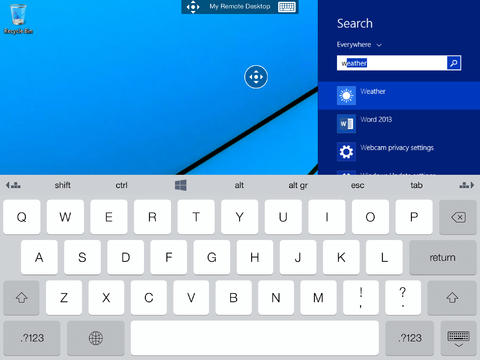
Microsoft brings Windows to Android and iOS phones and tablets
Microsoft's big release of the day may be Windows 8.1, but it doesn't end there. The desktop operating system may have stolen the headlines today, but Microsoft also recognizes the importance of mobile devices. The company is not only concerned with its own devices, realizing that Apple and Android still dominate the mobile arena. But this does not mean that mobile users do not need access to Windows PCs -- hence the release of Microsoft Remote Desktop for iOS and Android.
The prospect of running Windows on an Android or iOS device may be a little way off yet, but it can be achieved via remote access -- which has the handy side effects of making it possible to access files, apps and anything else that might be needed whilst away from your computer. There is no shortage of remote desktop apps in the App Store, but Microsoft's offering aims to keep things simple. As you would expect, this is an app -- free of course -- that can be used to control a Windows PC from an iPhone, iPad, iPod touch or Android device.

Ever wondered how much time you spend staring at screens?
You’ve probably never given any thought to exactly how much time you spend gazing, gawping, glowering and glaring at screens on a daily basis -- but with TVs, computers, tablets and smartphones being such a major part of our lives, you probably won’t be surprised to hear it’s a lot.
Virtual meetings specialist PGi was curious to find out exactly how much time the average person spends a day looking at various screens and has created an infographic which reveals the shocking (or, depending on your viewpoint, not so shocking) results.

iriver ON monitors your exercise while playing music
Over the years, I have been, first increasingly, then decreasingly, weighed down on my daily runs. A simple Ironman watch morphed into the first GPS watch, complete with a transmitter strapped to my arm, and then a chest strap for heart rate monitoring was added to the mix. Since then devices have become smaller and functionality has been rolled together. Now iriver announces ON, which takes that concept another step.
The ON is an exercise headset that does a bit more than just let you listen to your tunes to pass the miles away. "Powered by PerformTek sensor technology, the iriver ON accurately monitors more real-time fitness data from a single source than any other personal monitor, including heart rate, distance, speed, VO2 max (aerobic fitness level) and calories burned", the announcement explains.
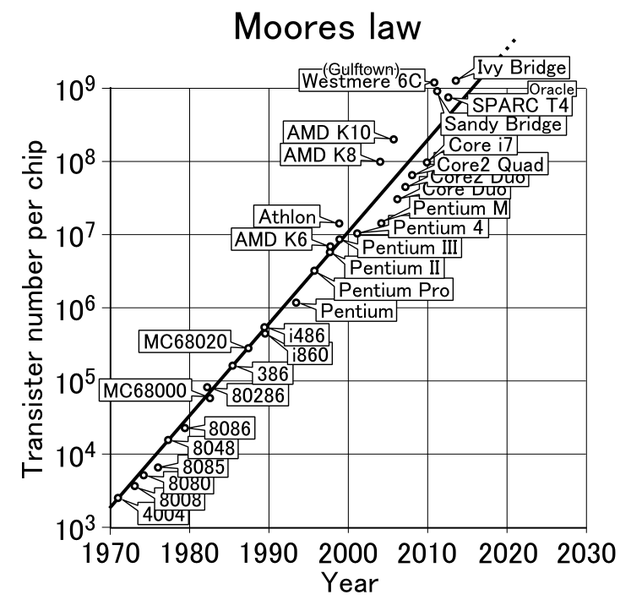
Breaking Moore’s Law
No law is more powerful or important in Silicon Valley than Moore’s Law -- the simple idea that transistor density is continually increasing which means computing power goes up just as costs and energy consumption go down. It’s a clever idea we rightly attribute to Gordon Moore. The power lies in the Law’s predictability. There’s no other trillion dollar business where you can look down the road and have a pretty clear idea what you’ll get. Moore’s Law lets us take chances on the future and generally get away with them. But what happens when you break Moore’s Law? That’s what I have been thinking about lately. That’s when destinies change.
There may have been many times that Moore’s Law has been broken. I’m sure readers will tell us. But I only know of two times -- once when it was quite deliberate and in the open and another time when it was more like breaking and entering.

The most popular stories on BetaNews this past week: October 6 -- 12
In another busy week, Microsoft continued to promote Internet Explorer 11 by showing off some of the new features that will be available to Windows 8 users. At the same time, the company released a tool that lets Windows 7 users block the update. Microsoft also announced that it would speed up the approval process for apps submitted to the Windows Store, so initial certification can be complete within five days.
Moving away from the desktop, champagne corks were popping as it was revealed that Raspberry Pi has sold 1.75 million units. After the launch of Mavericks, Mihaita was taken with his MacBook Air, and I was quite impressed with the Tesco Hudl -- although it's not going to be replacing my Nexus 7 any time soon.

Look out -- the robot middle-class is on the way
The emergence of a generation of smart machines taking over middle-class jobs within 15-years is a "futurist fantasy" according to 60 percent of respondents to Gartner's 2013 CEO survey. However, the analysts predict the rise of smart machines will have widespread business impact within only seven years.
"Most business and thought leaders underestimate the potential of smart machines to take over millions of middle-class jobs in the coming decades," says Kenneth Brant, research director at Gartner. "Job destruction will happen at a faster pace, with machine-driven job elimination overwhelming the market's ability to create valuable new ones".

T-Mobile customers gain unlimited international data and texts… for free!
T-Mobile is taking the wraps off the next stage of its "uncarrier" program, revealing that from the end of October anyone on its Simple Choice plans are going to get something for free. Not just any old something. Free text and free unlimited data. It doesn't end there. The free offers work on a global scale, meaning that international data and texts will be free in more than 100 countries.
John Legere, president and CEO of T-Mobile US, Inc. says "Today's phones are designed to work around the world, but we're forced to pay insanely inflated international connectivity fees to actually use them. You can't leave the country without coming home to bill shock. So we're making the world your network -- at no extra cost".

Acer announces the C720 Haswell Chromebook
The technology community is abuzz with excitement over the next-generation of Chromebooks. Yesterday, my colleague Joe Wilcox reviewed the sexy $279 Chromebook 11 by Hewlett-Packard. Sadly, while HP's Chromebook looks great, it is very much under-powered. After all, the specs are the same as last year's Samsung model -- ARM processor and a paltry 2GB of RAM.
Today, Acer announces the C720 which undercuts the HP variant in price and trumps it in specifications.

Twitter and Comcast announce See It -- control your TV with tweets
Folks are increasingly using Twitter while watching their favorite TV shows. A couple of days ago, Nielsen announced that viewers were becoming more engaged with television as a result. However, I argued that this could potentially distract users from both the programming and advertising. Today, Twitter and Comcast announce a partnership that looks to bring users to the TV with the power of tweets, rather than pull them away, with a feature called See It.
"It's a simple, but exciting tool that helps people more easily watch the shows they read about or discover online. See It lets people tune-in or record their favorite shows -- directly from the conversations happening on Twitter. In a typical week, #thevoice generates more than 350,000,000 Twitter impressions. What’s missing is how to seamlessly move from that conversation to consumption. And that's where See It comes in", says Sam Schwartz, chief business development officer at Comcast.

BBC partners with streaming sites to launch Playlister
You know how frustrating it can be when you hear a track on the radio or TV and miss the announcement that tells you what it's called? With the public beta launch of its new Playlister tool the BBC aims to offer a solution to that problem.
Using Playlister you can tag tracks from across the BBC's web services which will be saved to a personal playlist. Once you've created a list you can export it as a PDF or print it out, but more usefully you have the option to export the list to Spotify, Deezer or YouTube so that you can stream the tracks. Other services are expected to be added in future.

Nest Protect -- a Wi-Fi smoke and carbon monoxide detector
When it comes to fire, you can never be too safe. Sadly, I know all too well. You see, I once lived through a fire that destroyed my apartment and all of my belongings. While it was a devastating event, I came out of it uninjured and with a new respect for fire safety.
Today, Nest announces a new product that combines technology with not only fire safety but carbon monoxide protection too.

Adblock Plus reveals details about how its whitelists work
Adblock Plus is in its seventh year of clearing out advertisements from web pages, and is now for the first time sharing details about how its whitelisting system works. Known as Acceptable Ads, Adblock Plus recognizes the fact that advertising exists for a reason and is a cornerstone that keeps the internet running.
For this reason, advertisements that meet certain criteria are whitelisted, and Adblock Plus' Ben Williams reveals details of how the process works.
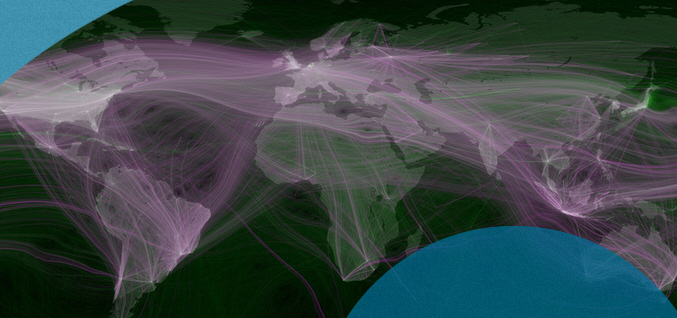
Alliance for Affordable Internet wants to drive down the cost of web access around the world
We have a tendency to take access to the internet for granted, but for people in many countries it is a luxury that is prohibitively expensive. This is something that the Alliance for Affordable Internet (A4AI) wants to change, aiming to drive down the cost of web access worldwide so that it works out to less than 5 percent of monthly income. A4AI is a consortium of tech companies and other organizations which has the backing of Sir Tim Berners-Lee, the inventor of the web.
Membership includes such names as Google, Yahoo, Microsoft, Facebook and Intel, and the alliance wants to do something about the fact that around two thirds of the world's population is not online. The coalition cites figures from the International Telecommunication Union that shows that while internet access in developed countries can cost as little as 2 percent of household income, in other parts of the world this can spiral up to around a third.
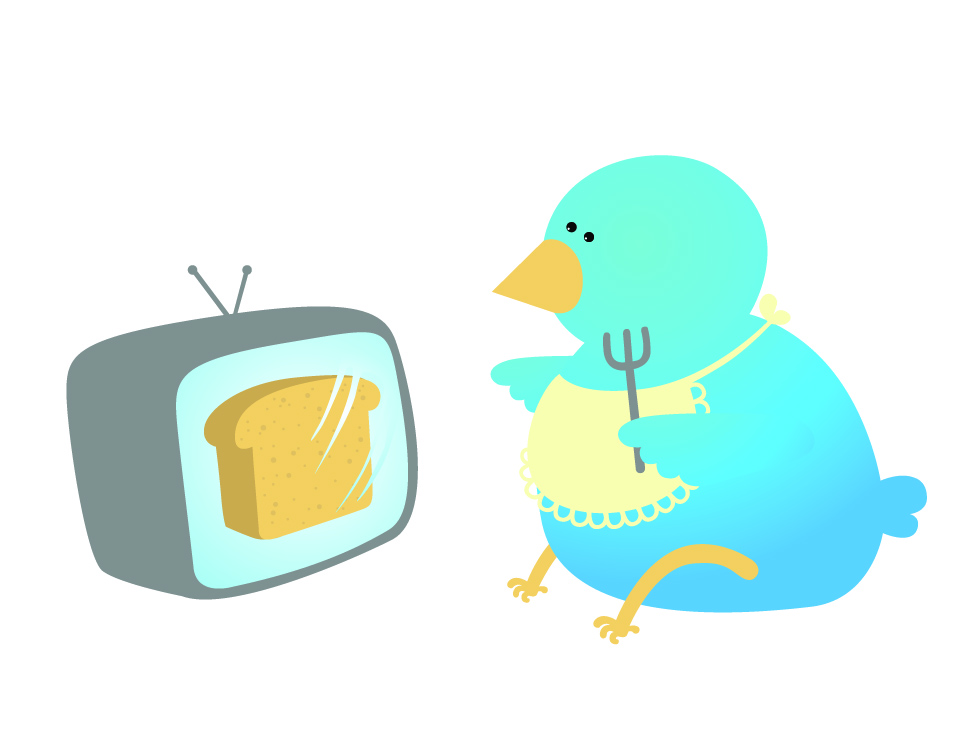
Nielsen Twitter TV ratings revealed -- viewers are distracted
Whenever I watch TV, my tablet is with me. I am often tweeting, instant messaging and playing games while "watching" TV. Because I am so distracted, I must use the term "watching" loosely and apparently, I am not alone. You see, tweeting while watching television is so prevalent, that Nielsen and Twitter teamed-up to establish a social TV rating last year.
At the time, Twitter said "as the experience of TV viewing continues to evolve, our TV partners have consistently asked for one common benchmark from which to measure the engagement of their programming. This new metric is intended to answer that request, and to act as a complement and companion to the Nielsen TV rating". Today, almost a year later, the results of the agreement have come to fruition.
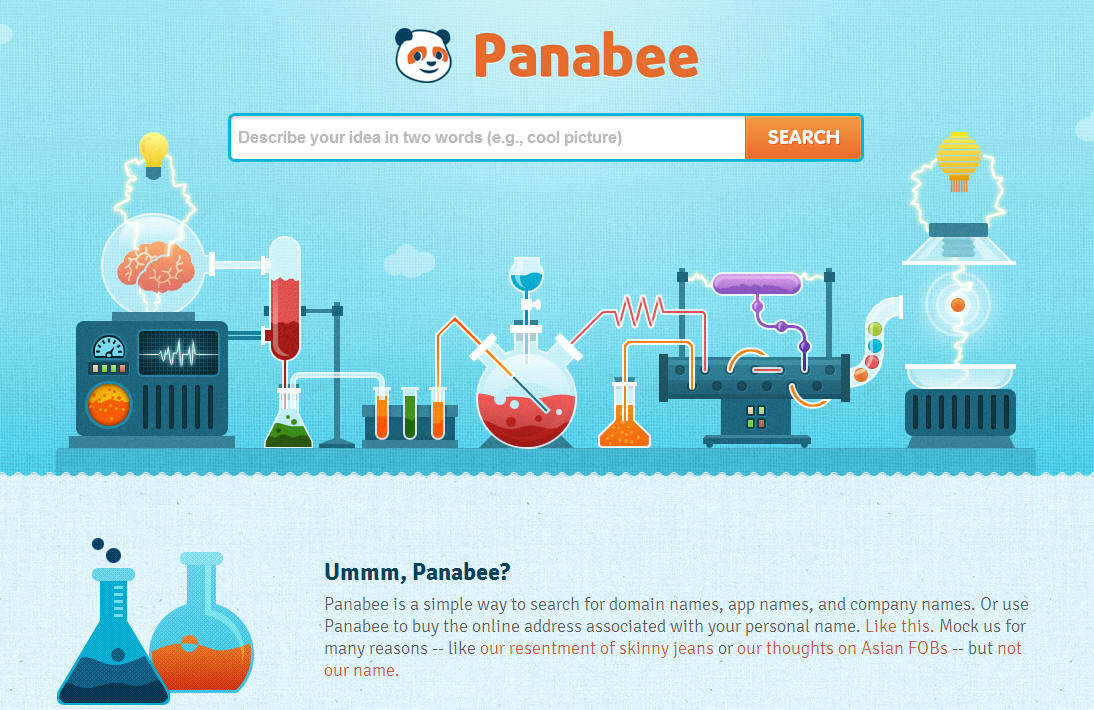
Panabee sets sights on Go Daddy
As the Internet gets bigger and more crowded it can be increasingly difficult to find a catchy domain name. Startup company Panabee aims to provide a simple tool for individuals and businesses to find great domain names and it has just reached the milestone of 10 million monthly searches -- up 50 percent from 2012.
Given the scarcity of available names, Panabee offers a new interface for brainstorming alternatives besides dot-coms. As consumers become more Internet savvy, it allows businesses to embrace different domain endings like .co.uk, .biz, .net and more.
